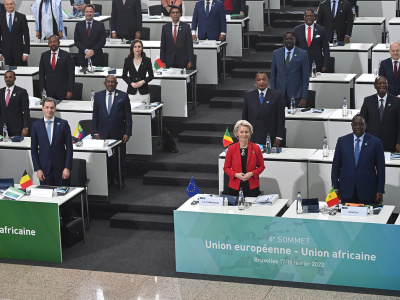
Towards a Transformative Post-2015 Development Agenda
Africa is making rapid progress on the Millennium Development Goals (MDGs) despite its initial conditions and the failure of development partners to make good on their commitments for official development assistance (ODA). Even though the continent is unlikely to meet all the goals by 2015, the continent it is on track to achieve primary school enrolment and gender parity in primary education.
Enrolment in primary schools is up from 64 percent in 2000 to 87 percent in 2010. Women across Africa are becoming more empowered, with more girls attending both primary and secondary school, and more women in positions of political power. And, even though most African countries are unlikely to achieve the MDG health targets, the rate of progress has accelerated in recent years. Africa is also actively adopting new technologies particularly through innovative applications of mobile phones for financial transactions. Overall, both the rate of extreme poverty and the absolute number of poor in Africa declined between 2005 and 2008 (from 56.5 to 47.5 per cent - excluding North Africa, or 19 million people less).
But more needs to be done. The continent faces the overarching challenges of inequality, low quality of service delivery and vulnerability to economic and climate-related shocks. And notwithstanding rapid growth in recent years, almost half the African population is below the poverty line, unemployment particularly among the youth is high, over a third of primary school pupils drop out of school and child and maternal deaths are above the global average. Vulnerable employment accounts for some 70 per cent of employment growth, and is largely overrepresented by women. Poor sanitation, limited access to improved drinking water sources and declining forest cover are among the most pressing environmental challenges facing the continent and climate change is likely to exacerbate the problem.
Beyond 2015
With the target year of 2015 rapidly approaching it is imperative to ensure that most if not all the MDGs targets are met. In parallel it is essential for the continent to play a central role in shaping the contours of the successor development framework dubbed the post-2015 development agenda.
In 2011, the United Nations Economic Commission for Africa (UNECA) began the process of facilitating consultations aimed at identifying Africa’s priorities for the post 2015 development agenda. In 2012 this initiative was reinforced by a mandate by the African Unions heads of state, which called on UNECA, in partnership with the African Union Commission (AUC) and other pan-African institutions, to deepen the consultations with the objective of formulating an African common position on the issue. The findings will feed into the report of the High Level Panel on the post-2015 development agenda set up by the UN Secretary General, a regional perspective report on the post-2015 agenda authored by the five UN regional commissions and the Secretary General’s report on the same subject in September 2013.
So far, the consultations point to a post-2015 agenda that:
- promotes African countries’ resilience to socio-economic and climate-related shocks by addressing associated vulnerabilities;
- adapts the current framework to new and emerging development challenges; and
- focuses on both the outcomes and enablers of development.
Towards transformation
The overarching priority is for an economic transformative agenda that:
- promotes sustainable and inclusive growth;
- is underpinned by human development, technological adaptation and innovation and;
- is facilitated by an enabling domestic and external environment.
The key elements of an effective transformation agenda for Africa comprise: a declining share of agriculture in GDP and employment; the transformation of rural areas into vibrant hubs of agri-business and industrial activity; the rise of a modern industrial and service economy; the translation of Africa’s youth bulge into a demographic dividend; access to social services that meet minimum standards of quality regardless of location; reduced inequality – spatial and gender; and progression towards an inclusive green growth trajectory.
Realizing the transformation agenda
Economic transformation is unlikely to be achieved through the unfettered actions of the market. It requires: visionary leadership and a democratic and capable state; a healthy and well educated population; value chains that link raw material producers to end users; fair access to local, regional and global markets; access to technology; inclusive green growth initiatives that tap into national endowments and sources of competitive advantage, such as solar energy; a vibrant civil society that engages and enforces accountability; and a robust and sustainable financing architecture that draws on domestic and external sources.
However, to be sustainable, transformation must be anchored by an enabling domestic and global environment. Important enablers for Africa include enhanced peace and security, good governance, human rights for all, strengthened access to justice and equality, and enhanced capacity to measure progress.
Invariably, economic transformation and social development are inextricably linked and mutually reinforcing. The post-2015 development agenda provides a unique opportunity to integrate both the economic and social dimensions of development through the lens of transformation. It also presents an opportunity for early engagement of a broad segment of stakeholders in the consultation process, a dimension which was conspicuously missing from the MDGs. The Economic Commission for Africa has been instrumental in facilitating early engagement of African stakeholders in the process. The challenge is to ensure that Africa’s priorities are credibly reflected in the successor framework. There is no doubt that stakeholders will be vigilant and keep a watchful eye on the process as well as its outcomes.
Prof. Bartholomew Armah is Chief, Renewal of Planning Section Macroeconomic policy Division, UNECA.
This article was published in Great Insights Volume 2, Issue 3 (April 2013)

